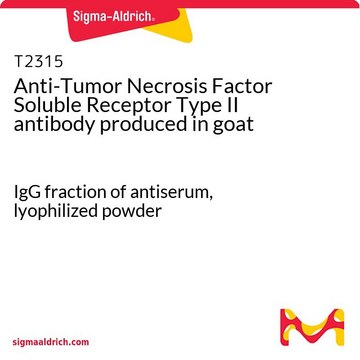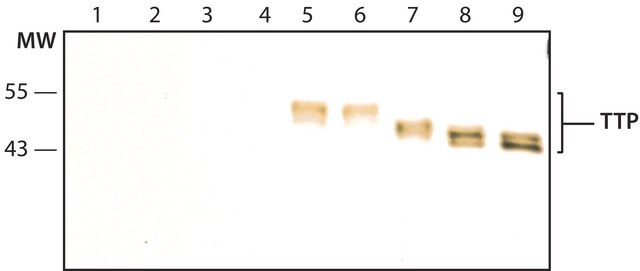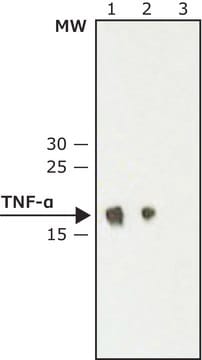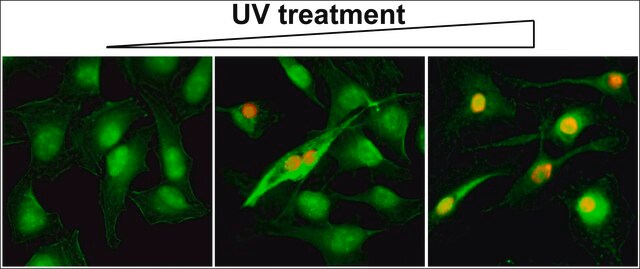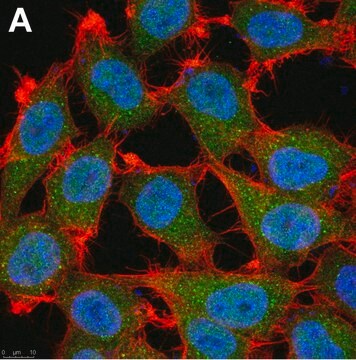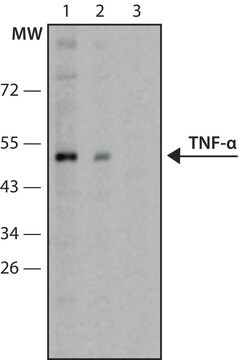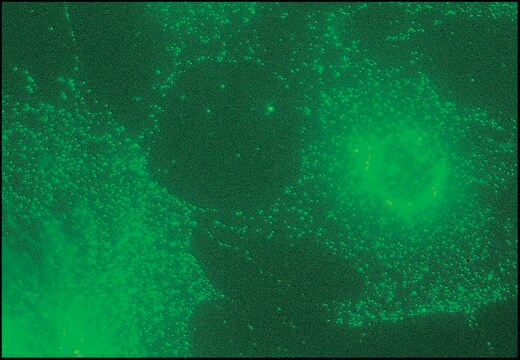推荐产品
生物源
mouse
品質等級
共軛
unconjugated
抗體表格
purified immunoglobulin
抗體產品種類
primary antibodies
無性繁殖
22221, monoclonal
形狀
lyophilized powder
物種活性
human
技術
immunocytochemistry: 8-25 μg/mL using immersion fixed human peripheral blood lymphocytes
microarray: suitable
neutralization: suitable
同型
IgG2a
UniProt登錄號
儲存溫度
−20°C
目標翻譯後修改
unmodified
基因資訊
human ... TNF(7124)
一般說明
肿瘤坏死因子超家族 (TNFSF) 包括至少 19 种通过蛋白水解产生的可溶性形式的跨膜蛋白。TNF 的生物学效应由 I 类型或 II 类型受体介导。广泛存在于所有细胞中的 I 型受体,而 II 型受体仅在免疫系统细胞(单核细胞、巨噬细胞、朗格汉斯细胞)和内皮细胞中表达。TNFSF 的受体如 TNFRⅠ 和 Fas 有自己的死亡结构域激活细胞凋亡。其他受体如 TNFR II 没有死亡结构域,利用 TNF 相关因子 (TRAFs) 激活细胞内信号。TNFR II 激活 NF-κB 通过激活 NIK 途径。单克隆抗肿瘤坏死因子受体 Ⅱ 抗体识别人 TNFRⅡ。
特異性
该抗体可中和重组人 TNF RII 的生物效应。不与 TNF RI 中和或交叉反应。
免疫原
重组人肿瘤坏死因子受体 Ⅱ,在 大肠杆菌中表达 。
應用
抗肿瘤坏死因子受体 Ⅱ 抗体可用于免疫细胞化学检测,工作浓度为 8-25μg/ml,使用人外周血淋巴细胞。该抗体适用于中和试验和蛋白质芯片。使用人 CD8 T 细胞将该抗体用于流式细胞术。
外觀
在含有碳水化合物的磷酸盐缓冲盐水中从 0.2 μm 过滤溶液冻干。
準備報告
使用蛋白 A 纯化
免責聲明
除非我们的产品目录或产品附带的其他公司文档另有说明,否则我们的产品仅供研究使用,不得用于任何其他目的,包括但不限于未经授权的商业用途、体外诊断用途、离体或体内治疗用途或任何类型的消费或应用于人类或动物。
未找到合适的产品?
试试我们的产品选型工具.
儲存類別代碼
12 - Non Combustible Liquids
水污染物質分類(WGK)
WGK 1
閃點(°F)
Not applicable
閃點(°C)
Not applicable
Liqin Ban et al.
Proceedings of the National Academy of Sciences of the United States of America, 105(36), 13644-13649 (2008-08-30)
Human autoimmune (AI) diseases are difficult to treat, because immunosuppressive drugs are nonspecific, produce high levels of adverse effects, and are not based on mechanistic understanding of disease. Destroying the rare autoreactive T lymphocytes causing AI diseases would improve treatment.
The Role of Costimulatory Receptors of the Tumour Necrosis Factor Receptor Family in Atherosclerosis
Antunes RF et al
Journal of Biomedicine and Biotechnology, doi: 10-doi: 10 (2012)
B B Aggarwal
Annals of the rheumatic diseases, 59 Suppl 1, i6-16 (2000-10-29)
Tumour necrosis factor (TNF) is a pleiotropic cytokine that mediates apoptosis, cell proliferation, immunomodulation, inflammation, viral replication, allergy, arthritis, septic shock, insulin resistance, autoimmune diseases, and other pathological conditions. TNF transduces these cellular responses through two distinct receptors: type I
M Lotz et al.
Journal of leukocyte biology, 60(1), 1-7 (1996-07-01)
Receptors in the nerve growth factor/tumor necrosis factor receptor family are characterized by the presence of cysteine-rich motifs of approximately 40 amino acids in the extracellular domain. The ligands are type II transmembrane proteins with beta-strands that form a jelly-roll
Joana Gonçalves et al.
The European journal of neuroscience, 31(2), 315-326 (2010-01-16)
Methamphetamine (METH) causes irreversible damage to brain cells leading to neurological and psychiatric abnormalities. However, the mechanisms underlying life-threatening effects of acute METH intoxication remain unclear. Indeed, most of the hypotheses focused on intra-neuronal events, such as dopamine oxidation, oxidative
我们的科学家团队拥有各种研究领域经验,包括生命科学、材料科学、化学合成、色谱、分析及许多其他领域.
联系技术服务部门